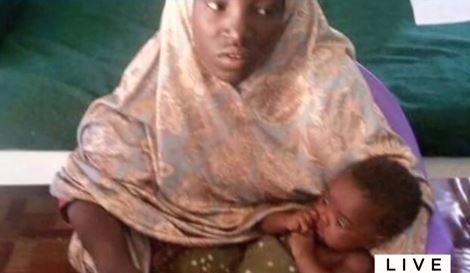
BORNO, Nigeria (BP) — One of the 219 missing Chibok schoolgirls Boko Haram kidnapped has been found alive in Nigeria’s remote Sambisa Forest, the French press agency AFP reported May 18.

The schoolgirl’s recovery ignited hopes for the safe return of more than 200 Chibok schoolgirls who remain missing, many of whom were Christians when Boko Haram kidnapped them and destroyed their boarding school more than two years ago. Many had been feared forced into chattel “marriages” with Muslims or killed as suicide bombers.
The girl told community members that other Chibok schoolgirls were in the Sambisa Forest, but “six were already dead,” the AFP reported.
Her escape occurred just a month after UNICEF released the report, “Beyond Chibok: Over 1.3 million children uprooted by Boko Haram violence,” which indicated the use of suicide bombers had increased 11-fold in 2015 from the previous year in Cameroon, Nigeria, Chad and Niger, where the terrorists have been most active. The report estimated 44 children, 75 percent of them girls, died as suicide bombers in 2015, compared to four in 2014.
The recovered girl’s name differed among news reports which identified her variously as Amina Ali, Amina Ali Nkeki or Falmata Mbalala, but her identity as a Chibok schoolgirl was deemed certain. It is not uncommon for girls to use different names at least between home and school, a Chibok school leader told the AFP.
Also varying were news reports of her condition, although all said she was at least physically well. Sources told AFP she appeared to have given birth recently, while the Associated Press reported that the girl’s uncle described her as pregnant and traumatized. CNN reported that the girl was accompanied by a baby and a man who described himself as her husband and said he also had been kidnapped by Boko Haram.
“Their bodies didn’t look good,” CNN quoted a witness identified as Aboku Gaji, a member of the Civilian Joint Task Force assisting the military. “They had had no bath and were in a dirty condition.”
The recovered girl was among 276 girls Boko Haram kidnapped on April 14, 2014. Nearly 60 of the girls managed to escape from the backs of trucks either during the kidnapping, or shortly afterwards as Boko Haram camped.
As recently as the second anniversary of the kidnapping, Nigerian President Muhammadu Buhari told parents and activists working for the girls’ release that he believed they could still be freed and was working “diligently to ensure that the girls are returned home unharmed.” Buhari made the comments after a Boko Haram video surfaced that the terrorists reportedly gave Buhari’s administration as a “show of good faith” that the girls were alive. The video included 15 girls and reportedly had been taken on Christmas 2015.
At that time, the girls were believed to have been divided in groups perhaps as small as 10 and dispersed among various Boko Haram cells, This Day reported in April.
Months after Buhari claimed a “technical defeat” of Boko Haram in December 2015, a regional multinational military force of 8,700 fighters from Nigeria, Benin, Cameroon, Chad and Niger continues to report successes against the jihadists while suicide bombings still occur.
In its report, UNICEF described Boko Haram’s displacement of children as the “fastest growing humanitarian crisis in Africa.” The number of displaced children increased by more than 60 percent since May 2013, rising from 800,000 to 1.3 million, the report said. Including children and adults, more than 2.3 million people were considered displaced in Nigeria (1.9 million), Cameroon (211,000), Niger (157,000) and Chad (55,000).
“Hit-and-run attacks and suicide bombings are depriving people of essential services, destroying vital infrastructure and sowing fear,” the report said. “In North-East Nigeria, about 90 percent of displaced families are sheltered by some of the world’s poorest communities, placing additional strain on already limited resources.”
Working to establish strict Sharia law across Nigeria, Boko Haram has been most active in northeastern Nigeria where many of the 20,000 deaths occurred that the terrorists are blamed for since 2009. Boko Haram originally targeted Christians, but has also killed moderate Muslims.
Killings of Nigerian Christians increased 62 percent in the past year, according to the February report “Crushed But Not Defeated,” from the Open Doors religious freedom ministry and the Christian Association of Nigeria. Northern Nigerian Christian communities suffered at least 4,028 murders and 198 church attacks in 2015 from Boko Haram, Muslim Fulani herdsmen and others, compared to 2,484 killings and 108 church attacks the previous year, the Open Doors report said.
Between 2006 and 2014, Open Doors estimated, 11,500 Christians were killed in northern Nigeria; and at least 13,000 churches have been attacked, destroyed or abandoned since 2000. The report ranks Nigeria as 12th on the Open Doors 2016 World Watch List of the countries where it is most difficult to live as a Christian, and estimates 30 million Christians live in the region.















